Whoever told me once that Los Angeles is the kind of town that’ll chew you up and spit you out had clearly never ridden in an American Airlines airbus suspended in the cruel chasms of a torn and disturbed lid. They never knew how loud the sky could go. Maybe I don’t know either, because the discombobulated exhales of worried folk outmuscled the surrounding air’s tormenting drama. But I was sure death was about to greet me then, and on a flight to Chicago no less—a swift, if not vicious punishment for abandoning my Midwestern home for some sunny oceanside. Looking across the aisle, I watched a woman heave into the white bag we all know is far too small for any type of mid-flight hurling. In a panic, my eyes darted back to my phone and my fingers, in an effort to recoup some of the control I’d lost, pressed play on the only song I could think of—the song I listen to whenever my plane is preparing to land. First, a quiet. And then: Rick Danko’s voice singing, “And the dawn don’t rescue me no more. Without your love, I’m nothing at all.”
“It Makes No Difference” isn’t the Band’s best song (that’s “Acadian Driftwood”), and it isn’t even the best Last Waltz performance (that’s “Helpless”), but I do love picking a favorite. And “It Makes No Difference” is certainly mine. In my dreams I hear Danko singing, “Well, I love you so much and it’s all I can do. Just to keep myself from telling you,” and in my dreams I hear his bandmates singing “that I’ve never felt so alone before” back to him. And then the duet comes, as Robbie Robertson’s guitar and Garth Hudson’s saxophone harmonize in anguish—as if a final conversation written off instinct alone. And the audience—some 5,000 folks full on 200 turkeys, 300 pounds of salmon, 1,000 pounds of potatoes, 90 gallons of gravy, 500 pounds of cranberry sauce, 400 gallons of cider, and 400 pounds of pumpkin pie—remain quiet the whole way, listening to what Danko and his bandmates had to sing about for seven brilliant minutes.
There was always something easy about the Band, wasn’t there? Even in my rock and roll youth, no one ever made much of a fuss over them. They were Ronnie Hawkins’ rockabilly backing band, and then they were Bob Dylan’s muscular, bluesy contemporaries. And somewhere within all that commotion, they changed their name and made two of the greatest albums of all time: Music from Big Pink and The Band. But The Last Waltz was an exhaustive, living biography spanning 42 songs. It heightened what I grew to love most about albums like Stagefright and Northern Lights – Southern Cross: a loose, scratchy, and telepathic balance shared between five players, all of whom seemed to be playing in tribute to one another, no matter how heavy the volatile, accumulating years on the road had begun to weigh on each of them.
The Northern Lights – Southern Cross version of “It Makes No Difference” was caustic and balmy, written by Robertson with a distant finale in mind. But the Last Waltz version is deeply crushing: Danko was hooked on smack by then and visibly taking the Band’s imminent, pre-planned split harder than his four bandmates. Sometimes during the film, he is rosy and glad on stage. Other times, you’re not totally sure he’ll even finish the gig. The Last Waltz was weird and unlikely like that, because it was kind of impossibly put together. You had this all-star cast of players helping an all-star band say “farewell.” Muddy Waters would have been kicked off the bill had Levon Helm not protested his dismissal, yet there was no question that a bumbling and awful Neil Diamond was an essential player in the bloated runtime. Scorsese and the production team’s set design was leftover from the San Francisco Opera Festival’s La Traviata setup. The wooden pillars and chandeliers gave the Band little room to stretch out. The red drapery in Bill Graham’s Winterland Ballroom hideously swallowed the backdrop.
Watching The Last Waltz on Thanksgiving or the night before is a tradition kept by many, myself included. Every year I find a way to put it on. Last fall, it was me cramming my Criterion blu-ray into an on-the-fritz PlayStation 4. Last night, it played from the Tubi app on a television set in a house overlooking the Atlantic Ocean. This is the first Thanksgiving I’ve celebrated in seven years, because I am now madly in love with somebody who loves this holiday. So I took a plane to get here, and “It Makes No Difference” was again in my headphones for the landing. Because: wherever I go, there you are. Even when the scabs of this troubling holiday get rubbed open, I know what voices await my small, evaporating light.
The older I get, the less infatuated I am with the household names scattered across The Last Waltz. Van Morrison’s Rockette high kicks, the coke rock like a stalagmite in Neil Young’s nose, Mavis Staples’ “beautiful” exhale, Joni Mitchell singing the “Helpless” harmonies from behind the curtain, and the rollicking ensemble conclusion of “I Shall Be Released” all pale under the soothing light of the Band doing a number all by their lonesome, because those five guys were at their very best when they were performing songs that sounded a couple-hundred years old, in a pocket everybody wanted a piece of—a pocket as grooving as it was smart, because the Band gave a commanding, ineffable meaning to the idea of “playing by feel.” The Last Waltz makes me cry, laugh, and scream. Mostly, it makes me cry, cry, cry. But some years, especially this one, I can’t believe I’m still alive enough to love the comedy, suffering, and brief togetherness of such a sprawling and glorious ur-text. Even when Danko’s voice, strained and on-edge, can barely hit the big notes on “It Makes No Difference,” he hits them anyways. He was just making music, you know?
[embedded content]
Matt Mitchell is Paste’s music editor, reporting from their home in Los Angeles.




